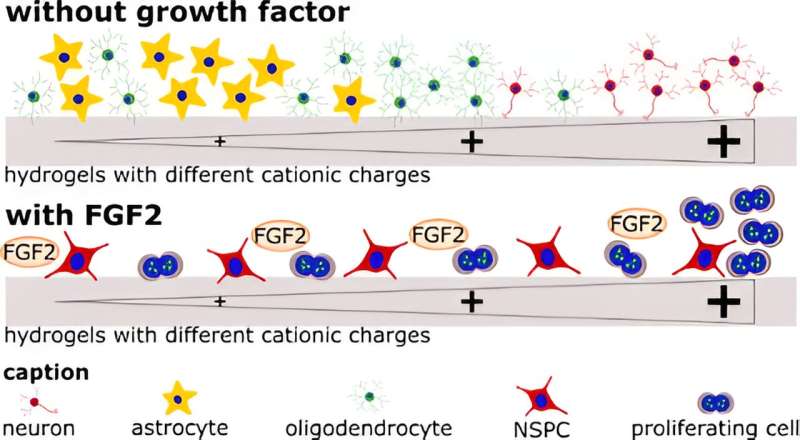This article has been reviewed according to Science X's editorial process and policies. Editors have highlighted the following attributes while ensuring the content's credibility:
fact-checked
trusted source
proofread
Scientists show positively charged hydrogels promote the survival and growth of neural stem cells

Researchers from Bochum and Dortmund have created an artificial cell environment that could promote the regeneration of nerves. Usually, injuries to the brain or spinal cord don't heal easily due to the formation of fluid-filled cavities and scars that prevent tissue regeneration.
One starting point for medical research is therefore to fill the cavities with a substance that offers neural stem cells optimal conditions for proliferation and differentiation. The team from Ruhr University Bochum and TU Dortmund University, both in Germany, showed that positively charged hydrogels can promote the survival and growth of stem cells.
Dr. Kristin Glotzbach and Professor Andreas Faissner from the Department of Cell Morphology and Molecular Neurobiology in Bochum cooperated with Professor Ralf Weberskirch and Dr. Nils Stamm from the Faculty of Chemistry and Chemical Biology at TU Dortmund University. They describe the findings in the journal ACS Biomaterials Science & Engineering.
Positively charged hydrogels promote survival and differentiation
The researchers studied neural stem cells from mouse embryonic brains, which they cultivated on positively charged hydrogels. "Our aim was to create an artificial environment for cells that mimics the natural cell environment in the brain," says Kristin Glotzbach.
"Cells have a negatively charged coating, also known as a pericellular matrix. This means they adhere particularly well to positively charged substrates." The trick with the hydrogels used in the experiments was that the strength of their positive charge could be precisely adjusted.
As the experiments showed, the positively charged hydrogels facilitated the survival of the cells and affected their future fate. If the stem cells adhered to hydrogels with a high positive charge, the cells tended to develop into nerve cells. On gels with a lower positive charge, on the other hand, the stem cells mainly developed into glial cells, which perform important auxiliary functions for the nerve cells.
The ability to influence whether stem cells differentiate into nerve or glial cells would be a great advantage. "Depending on the injury, different cell types need to be replaced," explains Kristin Glotzbach. It's not only the regeneration of nerve cells that is important.
"In certain diseases, glial cells are also attacked and need to be replaced. In multiple sclerosis, for example, the insulation of the nerve cells, which is made of oligodendrocytes, is destroyed."
Addition of growth factor improves survival rate
When the researchers added the growth factor FGF2 to the positively charged hydrogels, they successfully increased the survival and division rate of the cells. But the differentiation into nerve and glial cells then occurred at a slower pace.
"In future studies, we intend to add peptides or components of extracellular matrix molecules to the positively charged gels in order to simulate the natural environment of the cells even more efficiently," says Kristin Glotzbach. The researchers also plan to experiment with three-dimensional gels that could fill cavities after brain injuries.
More information: Kristin Glotzbach et al, Cationic Hydrogels Modulate Neural Stem and Progenitor Cell Proliferation and Differentiation Behavior in Dependence of Cationic Moiety Concentration in 2D Cell Culture, ACS Biomaterials Science & Engineering (2024). DOI: 10.1021/acsbiomaterials.3c01668
Provided by Ruhr-Universitaet-Bochum





















